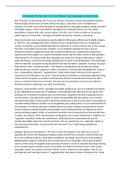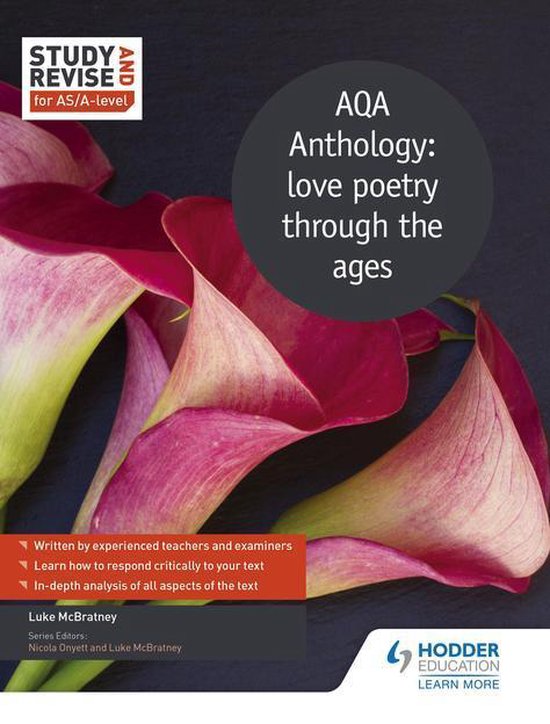In the poems ‘The Flea’ and ‘To His Coy Mistress’, love is presented as merely lustful .
Both ‘The Flea’ by John Donne and ‘To His Coy Mistress’ by satirist, lecturer and politician Andrew
Marvell largely present love as merely lustful, through a ‘carpe-diem’ style of metaphysical
seduction. Primarily, this is done through the encapsulation of attempted syllogism, double entendre
and phallic imagery- whilst concomitantly managing to be satirically humorous to the reader.
Nevertheless, despite their clear sexual motives, ‘The Flea’ and ‘To His Coy Mistress’ do portray
subtle aspects of iconoclastic, sacrilegious leitmotif and genuine romance, respectively.
Most prominently, love is presented as merely lustful in both poems with the use of phallic imagery.
In ‘The Flea’, this unsettling and rather repulsive insect is unexpectedly used as a metaphysical
conceit, to describe a sexual relationship with the addressee as a mere trivial act due to the concept
that their “two bloods” had already “mingled”. As an extended metaphor for lust, it may be
interpreted that the “pampered swells with one blood made of two” symbolise the tumescence
experienced by the speaker as a result of his lustful arousal, with the latter section of the quotation
referencing the 17th Century belief that copulation was simply the mixing of both partner’s blood
inside the woman, as well as the erectile engorgement of blood as aforementioned. This would align
with the adjective ‘pampered’ having originated from German dialect ‘pampfen’, meaning ‘to gorge’.
Alternatively, these “pampered swells” could allude to impregnation and the physical change
observed during a woman’s pregnancy, where ‘one blood’ is more literally and genetically ‘made of
two’. Comparatively, Marvell’s “vegetable love” holds similar phallic reference to the speaker’s
tumescence as he describes it to “grow”, with the purity and freshness of a growing vegetable being
a discreet hint at virginity; a construct contemporarily still seen to be desired in women by other
men as a symbol of innocence and worth. This has risen to prominence in recent years with the
feminist movement objecting to so-called ‘slut shaming’.
However, interpretations of this “vegetable Love [that] should grow” are not confined to the theme
of lust. Although the unusual use of ‘vegetable’ may metaphorically imply that his love grows and
develops but is ultimately insentient (just as an inanimate vegetable, therefore proposing that it is
merely lustful), it also allows the reader to explore the possibility that the speaker’s love is being
somewhat described as ‘deep-rooted’ and his lust simply took a natural course after his foundational
romantic feelings had been seeded. As root vegetables grow underground, it can be inferred that his
true feelings or emotional attraction is hidden below the surface, waiting to penetrate the soil and
become exposed; possibly denoting sexual imagery and furthering the idea of virginity and sexual
repression being masked. Finally, an emotional connection can be extracted from the idea that love
is organic and natural, which may then grow and progress into a sexual relationship. In addition, the
‘vegetable’ symbolises health and nourishment, reflecting that the relationship may also be
emotionally healthy rather than purely lust driven. The non-specificness of a ‘vegetable’ alludes to
the many forms love takes, not only merely lust- the word “Love” itself being capitalised to
emphasise this.
Likewise, Donne uses iconoclasm in ‘The Flea’ to show the speaker’s love and lust as a way of
opposing the Church and widespread religious values around love at the time. Donne himself was
born into a Catholic family at a time where Catholicism was illegal, and so for him to be passively
fighting against religious institutions was not unknown to him. Shockingly, Donne did eventually
convert to the Church of England (even becoming the Dean of St Paul’s Cathedral) and began writing
prose condemning the Catholic Church. For example, the ‘Book of Common Prayer’ which states
marriage is when “two shall be one flesh”(Genesis 2:24) is alluded to in the speaker’s talk of “our
marriage bed, and marriage temple is”, suggesting that this union is already complete in the “living





